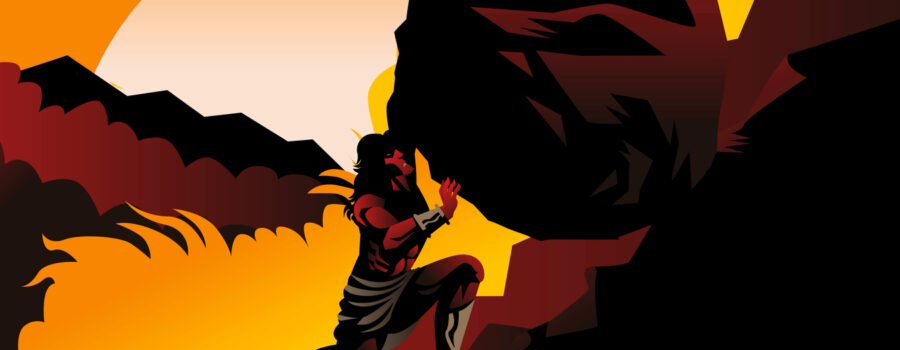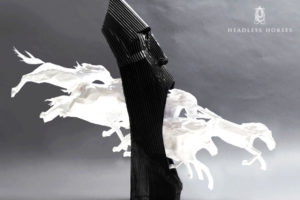NOVEMBER
Empirically Ephemeral: Stop Your Belly Aching and Get to Work
By Tricia Stewart Shiu
Empirically Ephemeral: Stop Your Belly Aching and Get to Work — Read by Tricia Stewart Shiu

The concept of “art” has taken on a whole new meaning. In fact, just about every task associated with producing a creative work, can be relegated to a daily chore or task with all the weight and drudgery of Sisyphus pushing a boulder up a hill.
But isn’t creativity supposed to be fun?
Empirical – verifiable by observation or experience
rather than theory or pure logic.
Ephemeral – Fleeting. Lasting for a very short time.
ARTISTIC ALLEGORY | LE MOT JUSTE
Wishing you were anywhere but here? It might be the most apt wish you’ve ever had, given our current circumstances. Nothing is permanent.
Is it harsh to expect productivity amidst all of the upheaval and uncertainty occurring around the globe, right now?

Perhaps—and yet, in this unprecedented, historically significant time, all measurements, bars set and/or limitations created have blown any semblance of “expectations,” to bits. Where’s the bottom? Or, for that matter, where’s the top of the spectrum? Are we anywhere that is significantly measurable?
For a minute, imagine that everything that is “trending” on social media reflects a broader sense of societal expectations and desires. Although, trusting polls and trends may not be the most viable way to measure a creative movement or event, watching several trends, over time, can be very telling.
Without even knowing it, we have gravitated toward the ephemeral. That fleeting experience that continues to open the floodgates of creativity and content. The very platform on which, SnapChat was built.

“Ephemeral content is a kind of content in a photo or video format that disappears after a certain period. It provides the viewers or audience a small window to see the content and engage with it. The concept of short-lived content on social media platforms was first seen back in 2011. Picaboo, the printing company headquartered in Hanover, New Hampshire, United States, first used this concept along with Snapchat. They mainly focused on providing a way to send photos or videos related to anything that disappears within a few seconds.” says a Crowdfire app article “5 Reasons Why Ephemeral Content Will Keep Gaining Popularity in 2020 & Beyond.”
Effortlessly, freely and fleeting, we are moving into a realm of possibilities, only don’t look away—even for a second—you might just miss it.
The best part is, no one is taking anyone else’s word for it. The do-it-yourself, TikTok, gotta-try-it, viral videos, show that we embrace an empirical approach to our lives and livelihoods.

Who knew that when SnapChat launched on July 8, 2011, that their globally used app would be embraced by every single one of us. Even if you haven’t used the incredibly popular app, it is possible that you are consuming content at a rate, on your own terms, that is much faster that even one year ago.
Pandemics, cultural upheavals and economic crises have a way of making even the most ardent planners, take pause when there are simply no plans to be made. Especially, when it comes to art. These types of world events have a way of bringing the focus of everything we do for our home and ourselves to the pragmatic.

To recap: we are moving toward our ever-changing goals in a “prove it or lose it” manner. Those “goals” include how we creatively express ourselves or, for that matter, how we move about our lives and experience the world.
Being present, is the entire premise of the book “The Power of Now” by Eckhart Tolle. By deeply connecting with each moment, however fleeting, Tolle says, it is possible to find infinite peace.

“… the psychological condition of fear is divorced from any concrete and true immediate danger. It comes in many forms: unease, worry, anxiety, nervousness, tension, dread, phobia, and so on. This kind of psychological fear is always of something that might happen, not of something that is happening now.”
It doesn’t make sense, on a variety of levels, to avoid staying present. Personal safety, is a top choice. To keep everyone safe, you must stay alert and aware. But, if you’re sitting in your own home, minding your own business and not operating any heavy machinery, what does it matter if your mind wanders? Who says that a little theorizing or “what-ifing” is harmful?

The problem is that, given enough time and attention, your mind can wander into some pretty dangerous territory. Tolle weighs in on this by saying, “The mind is a superb instrument if used rightly. Used wrongly, however, it becomes very destructive. To put it more accurately, it is not so much that you use your mind wrongly – you usually don’t use it at all. It uses you.”

That’s where getting your hands a little dirty comes into play. There is nothing wrong with thoughts if they are followed by some well documented empirical research. Test whatever you’re questioning out. See what will happen if you do, whatever it is that you’re theorizing. Ask good questions.
Sometimes isolation is the very thing to spark a revolution of one. You’ll never know, unless you try.






